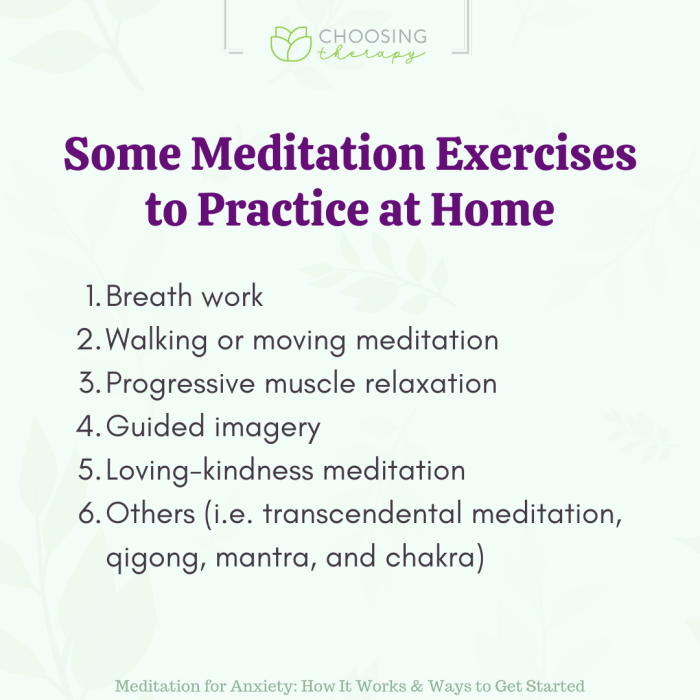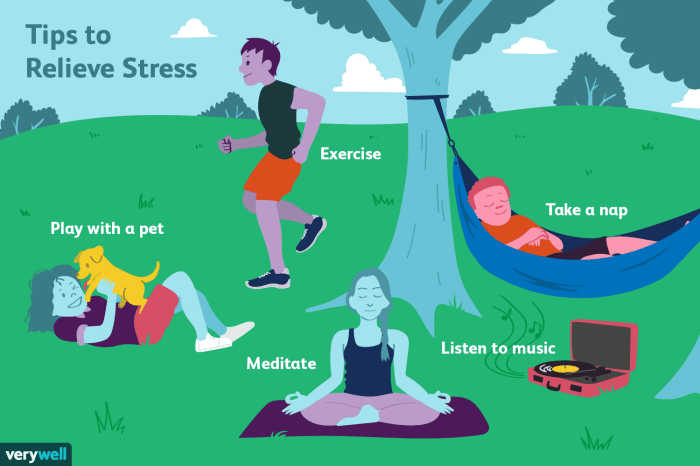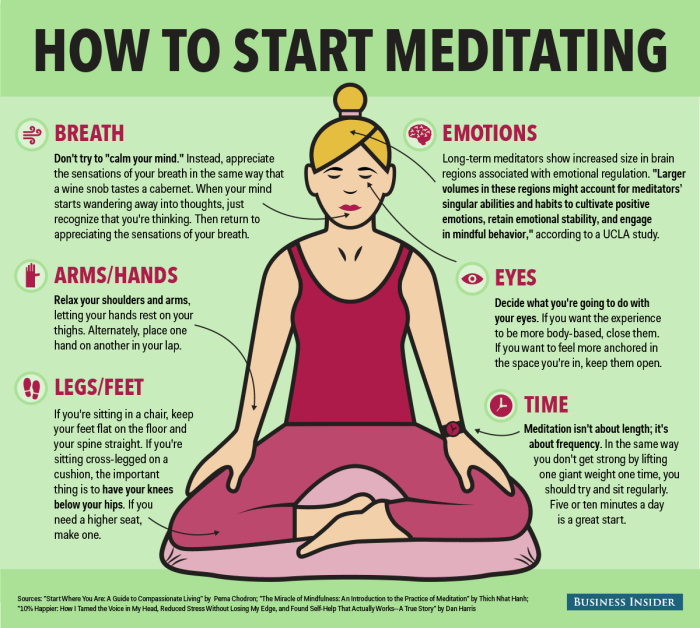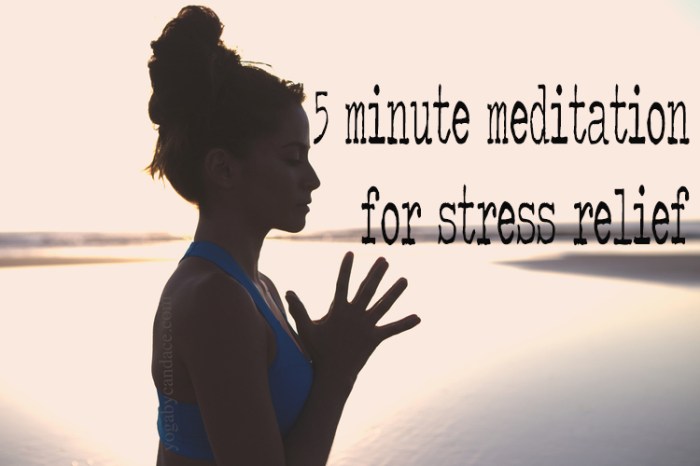How to Meditate for Overcoming Stressful Situations introduces the powerful practice of meditation as a means to conquer stress. Delve into the world of mindfulness and stress relief through meditation techniques that promise to transform your outlook on handling life’s challenges.
Explore the impact of stress on the body, effective meditation techniques, creating a serene meditation environment, and seamlessly incorporating meditation into your daily routine.
Introduction to Meditation for Stress Relief

In today’s fast-paced world, stress has become a common problem for many people. One effective way to manage and overcome stressful situations is through the practice of meditation. By incorporating meditation into your daily routine, you can experience a sense of calm and relaxation that helps reduce stress levels significantly.
Benefits of Meditation for Stress Management
- Meditation helps to quiet the mind and promote a sense of inner peace, allowing you to let go of negative thoughts and emotions that contribute to stress.
- Regular meditation practice can improve your ability to focus and concentrate, making it easier to deal with challenging situations without feeling overwhelmed.
- By cultivating mindfulness through meditation, you can become more aware of your thoughts and feelings, enabling you to respond to stress triggers in a more positive and constructive way.
- Studies have shown that meditation can lower cortisol levels, the stress hormone, in the body, leading to a reduction in overall stress and anxiety.
Role of Mindfulness in Stress Reduction
One of the key components of meditation for stress relief is the practice of mindfulness. Mindfulness involves paying attention to the present moment without judgment, allowing you to fully experience your thoughts and emotions without becoming overwhelmed by them. By practicing mindfulness during meditation, you can develop a greater sense of self-awareness and emotional resilience, which are essential for managing stress effectively.
Ready to start meditating but not sure where to begin? Follow these 7 Simple Steps to Start Meditating Today to kickstart your daily meditation routine and experience the benefits it brings.
Understanding Stress and its Impact on the Body

Stress is a natural response to challenging situations that can affect the body physically, mentally, and emotionally. When faced with stress, the body releases hormones like cortisol and adrenaline, preparing it for a fight-or-flight response.
Are you looking to get the most out of your meditation practice? Check out these 8 Essential Tips to Get the Most Out of Meditation that will help enhance your mindfulness journey.
Physical Effects of Stress
- Increased heart rate and blood pressure
- Muscle tension and headaches
- Weakened immune system
Mental Effects of Stress
- Difficulty concentrating and making decisions
- Memory problems
- Feelings of anxiety and irritability
Emotional Effects of Stress
- Depression and mood swings
- Feelings of overwhelm and helplessness
- Social withdrawal and isolation
Stressors in daily life can vary from work deadlines and financial pressures to relationship conflicts and health concerns. It’s essential to address stress effectively to prevent long-term negative effects on health, such as chronic diseases, weakened immune system, and mental health disorders. By practicing meditation and other stress-relief techniques, individuals can manage stress and improve their overall well-being.
Techniques for Meditating to Overcome Stress

Meditation can be a powerful tool for managing stress and promoting relaxation. There are several different techniques that can be effective for overcoming stressful situations.
Want to improve your mental clarity and focus through meditation? Learn How to Meditate to Improve Your Mental Clarity and Focus with these effective techniques that will sharpen your mind and concentration.
Mindfulness Meditation
- Focus on your breath and bring your attention to the present moment.
- Acknowledge any thoughts or feelings that arise without judgment, and gently bring your focus back to your breath.
- Practice regularly to build resilience to stress and increase mindfulness in everyday life.
Guided Meditation
- Listen to a guided meditation recording or follow along with a meditation app.
- Allow the soothing voice to lead you through a relaxation exercise, helping you to let go of stress and tension.
- Choose guided meditations that specifically target stress relief for optimal results.
Body Scan Meditation, How to Meditate for Overcoming Stressful Situations
- Start at the top of your head and slowly scan down through your body, noticing any tension or discomfort.
- Consciously release tension in each part of your body as you progress, promoting relaxation and stress relief.
- Focus on the physical sensations in your body to cultivate a greater awareness of stress and tension.
Deep Breathing Exercises
- Sit or lie down in a comfortable position and close your eyes.
- Inhale deeply through your nose, expanding your belly, and exhale slowly through your mouth.
- Focus on the rhythm of your breath and the sensation of air entering and leaving your body.
- Continue deep breathing for several minutes to calm your mind and reduce stress levels.
Creating a Relaxing Environment for Meditation: How To Meditate For Overcoming Stressful Situations

Creating a peaceful and comfortable space is essential for effective meditation. The environment you meditate in can greatly impact your ability to relax and focus. Let’s explore some tips on setting up the perfect meditation space.
Role of Lighting
- Avoid harsh overhead lighting and opt for soft, natural light sources like candles or dimmed lamps.
- Consider using colored lights or salt lamps to create a soothing ambiance.
Role of Aromatherapy
- Use essential oils like lavender, chamomile, or sandalwood to promote relaxation and reduce stress.
- Invest in a diffuser to spread the calming scents throughout your meditation space.
Role of Sound
- Play soft instrumental music, nature sounds, or white noise to drown out distractions and create a serene atmosphere.
- Consider using guided meditation recordings or binaural beats to enhance your meditation experience.
Eliminating Distractions
- Turn off electronic devices or put them on silent mode to avoid interruptions during your meditation practice.
- Clear clutter from your meditation space to create a clean and organized environment for better focus.
Incorporating Meditation into Daily Routine

Incorporating meditation into your daily routine can be a powerful tool for managing stress and promoting overall well-being. Consistency is key when it comes to reaping the benefits of meditation for long-term stress relief. By making meditation a regular part of your day, you can create a sense of calm and balance that extends beyond your practice sessions.
Strategies for Making Meditation a Consistent Part of Daily Life
- Choose a specific time each day to meditate, whether it’s in the morning before starting your day or in the evening before bed.
- Start with short meditation sessions and gradually increase the duration as you become more comfortable with the practice.
- Create a dedicated space for meditation in your home where you can practice without distractions.
- Use reminders or alarms to prompt you to meditate at the same time each day.
Benefits of Establishing a Regular Meditation Practice for Long-Term Stress Management
- Reduces the production of stress hormones, such as cortisol, in the body.
- Promotes relaxation and a sense of inner peace that can help you navigate stressful situations more effectively.
- Improves focus, concentration, and mental clarity, which can enhance productivity and overall well-being.
Examples of How to Integrate Meditation into Morning or Evening Routines for Stress Relief
- Start your morning with a 10-minute meditation session to set a positive tone for the day ahead.
- Wind down in the evening with a guided meditation to help you relax and unwind before bed.
- Combine meditation with other activities, such as yoga or journaling, to create a holistic approach to stress management.
In conclusion, mastering the art of meditation for overcoming stressful situations can lead to a more balanced and peaceful existence. By embracing mindfulness and consistent practice, you pave the way for a healthier relationship with stress and a calmer state of being.